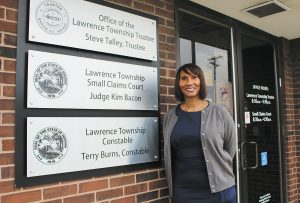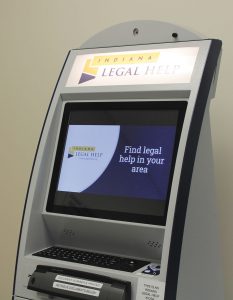Subscriber Benefit
As a subscriber you can listen to articles at work, in the car, or while you work out. Subscribe NowAbout $2.3 million in grants are helping Lawrence Township Small Claims Court Judge Kimberly Bacon hire additional staff to support a local eviction diversion program that is serving nearly all of Marion County.
The program uses court navigators to provide tenants with legal information, resources, and connection to legal aid as well as contract attorneys to facilitate agreements between landlords and tenants to prevent or mitigate the impact of an eviction and avoid a contested hearing.
It’s an important venture in Indianapolis, which has the fifth-highest eviction filing rate among 34 cities tracked by the Eviction Lab national database.
The program is fueled by $2 million from the Indiana Bar Foundation and $300,000 from the Nina Mason Pulliam Charitable Trust provided through the National Center for State Courts—all under a partnership with the Indiana Housing & Community Development Authority.

Chuck Dunlap, president and CEO of the bar foundation, said the funding will go toward hiring up to 12 court navigators that focus on housing. While they will be employed by Lawrence Township, they will serve all of the county’s townships except Perry and Wayne.
“They will sort of rotate amongst the various township courts who are having hearings that day, eviction hearings, and they will be there to support the tenants in the process,” Dunlap said.
Jeff Small, the Pulliam trust’s vice president of programs, said the trust has been looking at housing as an issue that it wanted to address.
“In Indianapolis affordability is certainly an issue, especially at lower incomes, which is we don’t really think about that in Indianapolis that much because we think of it as a place with really low cost of living but when you look at data about what the availability is in your price range, people with extremely low incomes still struggled to find affordable housing here,” Small said.
Small said the National Center for State Courts will be helping the local courts set up systems so they can better track and report the outcomes of the program.

Dunlap added that the funding for the program currently stops at the end of this year, along with the foundation’s current contract and partnership with the Indiana Housing & Community Development Authority.
“We are actively working on identifying additional paths to sustainability for this and other aspects of our IHCDA contract initiatives from 1/1/25 and beyond,” Dunlap said.
Bacon said that the biggest issue she sees in eviction cases is a simple lack of communication and this program helps fill the gaps.
She gave the example of a tenant who falls behind on payments and the landlord turns the matter over to an attorney without communicating with the tenant.
“So now you are just in this state of flux. And so, that can cause obstacles until the case gets filed, then you will have a little bit more information about what’s going on, but still not able to resolve it until you come to court. And you can have a full-blown conversation,” Bacon said.
Bacon said that providing a facilitator in the court allows for the conversation to occur with an attorney.
“If a tenant shows up for court, you’ve got a legal aid attorney that can come in and advise or do a limited appearance with that tenant to help them feel more secure,” Bacon said. “They feel like they have an even playing field because they understand a little bit more about what’s going on, because they’ve got someone informing them about what comes next.”

She added that being evicted isn’t a criminal matter, some tenants don’t think of it as having that much of an impact.
But in reality, that eviction goes on the tenant’s credit and can leave them scrambling to put a roof over not only their head, but their family’s as well.
“A lot of people think because I’m not being incarcerated under a criminal judicial system, they don’t realize that it creates a financial incarceration that precludes you from being able to live what you would hope to be your best life,” Bacon said.

Bacon said that her main goal is for people to see that this process is effective and keeps people housed. She said her court has a more than 60% dismissal and seal rate with eviction cases, meaning the majority of those cases get resolved.
Bacon’s next goal is to have the program’s services put into courts statewide.
Another initiative
Another program that the Indiana Bar Foundation is funding is the Tenant Advocacy Project.
“We talked with the city of Indianapolis and basically it’s the same things that we were doing around the state, the same legal aid providers,” Dunlap said.
He said the bar foundation has essentially taken over covering the costs of the project, saving the city an estimated $1.5 million.
Similar to the program Bacon started in Lawrence Township, the project also provides attorneys and navigators in almost all of Marion County’s township small claims courts.
Dunlap said digital kiosks the bar foundation has set up in counties across the state have helped in getting tenants connected with legal resources through the Indiana Legal Help website but having a helpful navigator physically available makes an even bigger difference.
“Essentially bringing those navigators into the courtrooms into the courthouses in Marion County, specifically during an eviction day when they have all the volume and all the people there so we’re trying to cover as many bases as we can to reach people remotely via their phone or their computer but also in rural areas with the kiosk where they may or may not have the bandwidth and the Internet capacity to be able to reach you the legal help,” Dunlap said.•
Please enable JavaScript to view this content.
